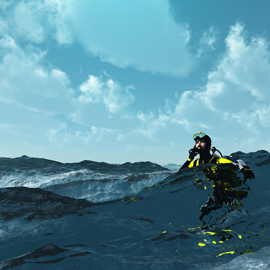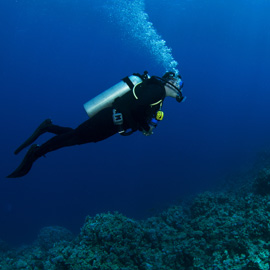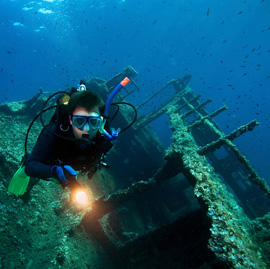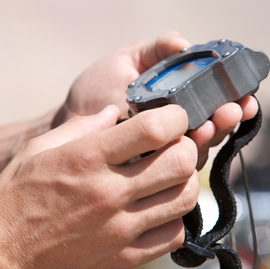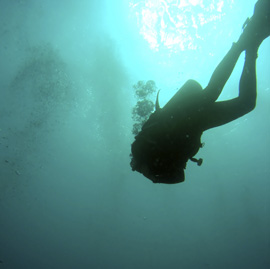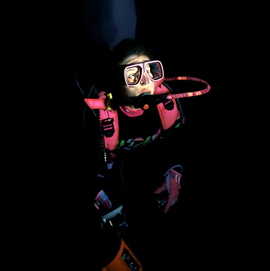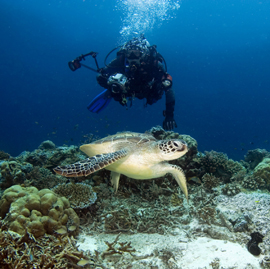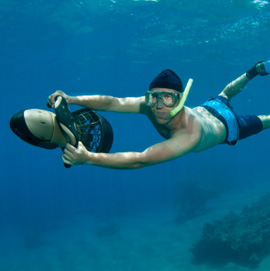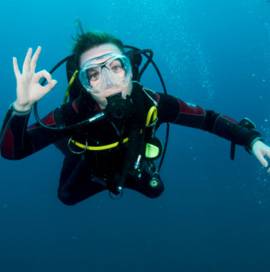Dive Blog | Do Dive In
Diving Dry
Cold weather can put a damper on diving, especially as Illinois becomes frostier as fall turns to winter. Chilly waters of the quarries and Great Lakes, though fun to explore, can seem less inviting as the temperatures above the surface continue to plummet. You may be tempted to give up your scuba dreams for the season, but like many problems in the colder months, the solution may be as simple as changing your clothes. [Read more]
Tips and Tools for Underwater Navigation
Though breathing underwater may be the most pressing challenge we face while diving, it isn’t the only one. The thrill of scuba diving comes from exploring an unfamiliar world, but these surroundings are not always easy to navigate—finding your way around is more complicated than it is on the surface. [Read more]
Diving Deeper
If you’re hoping to explore some wrecks, come face to face with unique ocean life and make the most of your scuba skills, deep diving is the way to do it. Unfortunately, those added rewards come with added risks. Diving deeper than 60 feet increases your chances of depleting your air supply and experiencing nitrogen narcosis, but these dangers can be overcome with proper training and preparation. [Read more]
Check Yourself Before You Wreck Yourself
Sunken schooners, algae-covered school buses, train cars, fire trucks and telephone booths—manmade treasures like these can make for a ton of underwater fun. Wreck diving gives you the chance to take in some very unusual sights, and the prevalence of these underwater ruins makes them accessible just about anywhere: at the depths of the ocean, in the chill of Lake Michigan and even in some of the Midwest’s limestone quarries. [Read more]
Picking the Perfect Dive Computer
Also known as a decompression or deco meter, a dive computer can be a vital part of staying safe on any dive after you get your scuba certification in Illinois. By determining the length and depth of your dive, a dive computer can provide the parameters you’ll need to stay within to keep your nitrogen levels from becoming problematic. [Read more]
Go with the Flow: The Basics of Drift Diving
During a drift dive, you’ll take advantage of the ocean’s currents to experience what it truly feels like to fly underwater. By exploring ocean areas with known currents, you can minimize your effort and maximize your distance and time, taking in the scenery as you’re carried parallel to stunning reefs and aquatic wildlife. But just as with any dive, preparation and education are essential to keeping your scuba experience as safe and enjoyable as possible. [Read more]
Night Diving Primer
Night diving lets you see any underwater world in a whole new way. A sweep of your dive light through the nighttime sea may reveal all sorts of creatures that seek refuge during the daylight hours: basket stars, lobsters, sea turtles, bioluminescent plankton and more. Your flashlight’s beam can expose mysteries you never imagined, even making the colors of the reef more radiant and intense. [Read more]
Capturing an Underwater Kodak Moment
If you’ve gotten your dive certification in Peoria, you’ve probably already started to create some lasting memories of your underwater excursions, but plucking a fish from its underwater habitat is a bad idea no matter how fervently you want to bring it home with you. Fortunately, you can still get a great memento from your trip with underwater photography. [Read more]
Take Your Fun Dive Further with a DPV
Here’s a no-brainer for you: how would you like to go further, faster and feel like James Bond on your next diving excursion? Though you may not have a super-spy accent or access to a jetpack or remote-controlled BMW, you can learn how to use one of Bond’s favorite forms of underwater transportation—the diver propulsion vehicle (DPV) or underwater scooter. [Read more]
Going Solo
A random buddy may be better than no buddy in the event of an emergency, but what if your random buddy creates more problems than he corrects? Experienced divers often face this dilemma, paired with a novice partner who needs mentoring and support but offers little in return. [Read more]
